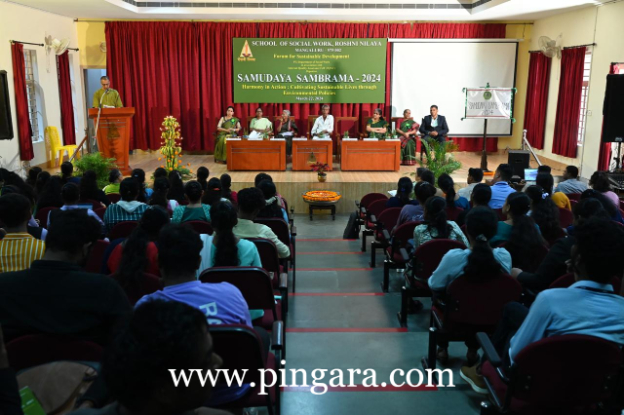Mangalore: The School of Social Work (Autonomous) Roshni Nilaya, Mangalore, in association with the Forum for Sustainable Development and the Internal Quality Assurance Cell (IQAC), is inaugurated here on March 22, 2024, at 9.30 am by Padma Harekala Hajabba.

During his speech, Fr. Arun Louis SJ, Director, Ashirvad, Bangalore and the key note Speaker highlighted three crucial areas of concern. Firstly, he provided a detailed overview of the current environmental scenario, underlining the urgent need for immediate action to address pressing environmental issues. He emphasized the importance of proactive measures to combat environmental degradation and promote sustainability. Secondly, Fr. Louis delved into the rights associated with environmental sustainability, emphasizing the pivotal role of social workers and institutions in advocating for these rights. He emphasised the significance of recognizing and upholding these rights as essential components of a sustainable future. Furthermore,

Fr. Arun also spoke about the detrimental impact of climate change, citing loss of biodiversity and over exploitation as significant challenges. He stressed the importance of not only acquiring knowledge but also implementing holistic approaches towards sustainability. He advocated for community empowerment and environmental justice as integral components of sustainable practices. He concluded his speech by emphasising the value of experiencing "samudaya sambrama" through living with communities, immersing oneself in their culture, and fostering harmony as essential elements in the journey towards environmental sustainability.

During her presidential address Prof Rita Noronha, Director, Centre for Development Studies and Education, Mangalore drew attention to the harsh disparity between economic progress and environmental degradation. She specifically highlighted pressing environmental issues such as drying borewells and water scarcity, emphasizing the disproportionate impact these challenges have on vulnerable groups like women and children. Rita underscored the urgent need for a collective embrace of sustainability to prevent irreversible damage to our environment, stressing the importance of inclusive approaches that consider the needs of marginalized communities and individuals.

Rita Noronha also delved into the crucial link between environmental pollution and sustainability, emphasizing that true progress in addressing these issues can only be achieved by actively including and empowering marginalized groups in decision-making processes. She called for a holistic approach that recognizes the interconnectedness of environmental challenges and social justice, advocating for a sustainable future that prioritizes the well-being of all individuals and communities.

During the first session on an innovative approach to harmonizing environmental policies with societal well-being, Prof. Dr. Lancelot D'Cruz SJ highlighted the challenges stemming from the gap between laws and their implementation. He emphasized the importance of recognizing the vast knowledge and resources held by aadivasis, who inhabit areas rich in biodiversity. With 22% of the world's tribal population residing in India, there is a wealth of traditional knowledge related to medicinal plants, with 15,000 to 20,000 species known only to aadivasis but not classified due to a lack of research. Prof. D'Cruz specifically mentioned the Dediyapada taluka, a tribal reserve area where the inhabitants possess extensive knowledge of medicinal plants, leading to the identification of 50 plant species added to official reports. His research aims to benefit common people by leveraging aadivasi knowledge to create income sources for these marginalized communities, who may lack resources and money but possess valuable expertise in plants and medicine. Through market studies, five plants with market potential were identified for cultivation, demonstrating a sustainable approach to economic empowerment.

In collaboration with the government, Prof. D'Cruz's work involved conducting ethnobotanical studies, networking with traditional medicine practitioners, and establishing mini-forests in five tribal schools. These initiatives aimed to preserve and promote the rich traditional knowledge of aadivasis while creating opportunities for economic growth and community development. Additionally, a database comprising information on 100 plant species was prepared, further contributing to the documentation and conservation of valuable indigenous knowledge. By bridging the gap between policy implementation and grassroots expertise, Prof. D'Cruz's efforts exemplify a holistic approach to environmental sustainability that prioritizes both biodiversity conservation and the well-being of marginalized communities.

Earlier, Prof. Anuradha Shetty provided an overview of the day's events and introduced the theme of the program, emphasizing the critical importance of sustainability for both present and future generations through effective environmental policies.


Harekala Hajabba, Prof. Reeta Noronha, Prof. Evelyn Benis, Prof. Juliet C. J, Prof. Vineetha, and Prof. Anuradha Shetty were recognized and congratulated for their outstanding contributions to community development and environmental sustainability. Vice Principal Dr. Jenis Mary was present during the occasion.
Prof. Eveleen Bennis HoD of MSW welcomed the gathering. Fr. Lawrence Cutinha proposed the vote of thanks. Fr. Amar Rai compeered. More than 250 delegates participated.
